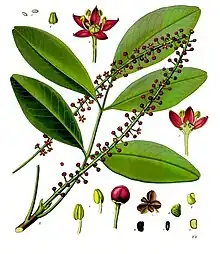Pilocarpus
Pilocarpus is a genus of about 13 species of plants belonging to the family Rutaceae, native to the Neotropics of South America. Various species are important pharmacologically as a source of the parasympathomimetic alkaloid pilocarpine.[1] Many of the species have the common name jaborandi.
| Pilocarpus | |
|---|---|
 | |
| Paraguay Jaborandi (Pilocarpus pennatifolius) | |
| Scientific classification | |
| Kingdom: | Plantae |
| Clade: | Tracheophytes |
| Clade: | Angiosperms |
| Clade: | Eudicots |
| Clade: | Rosids |
| Order: | Sapindales |
| Family: | Rutaceae |
| Subfamily: | Zanthoxyloideae |
| Genus: | Pilocarpus Vahl |
| Species | |
|
See text. | |
Etymology
The taxonomic name Pilocarpus is derived from ancient Greek πῖλος wool, felt + καρπός fruit.
Species
- Selected species
- Pilocarpus jaborandi (Pernambuco jaborandi)
- Pilocarpus microphyllus (Maranham jaborandi)
- Pilocarpus racemosus (Guadeloupe jaborandi)
- Pilocarpus pennatifolius (Paraguay jaborandi)[2]
- Pilocarpus spicatus (Aracati jaborandi)
References
- De Abreu, Ilka Nacif; Sawaya, Alexandra Cristine H. F.; Eberlin, Marcos Nogueira; Mazzafera, Paulo (November–December 2005). "Production of Pilocarpine in Callus of Jaborandi (Pilocarpus microphyllus Stapf)". In Vitro Cellular & Developmental Biology - Plant. Society for In Vitro Biology. 41 (6): 806–811. doi:10.1079/IVP2005711. JSTOR 4293939. S2CID 26058596.
- Chisholm, Hugh, ed. (1911). . Encyclopædia Britannica. Vol. 15 (11th ed.). Cambridge University Press. p. 104.
External links
This article is issued from Wikipedia. The text is licensed under Creative Commons - Attribution - Sharealike. Additional terms may apply for the media files.